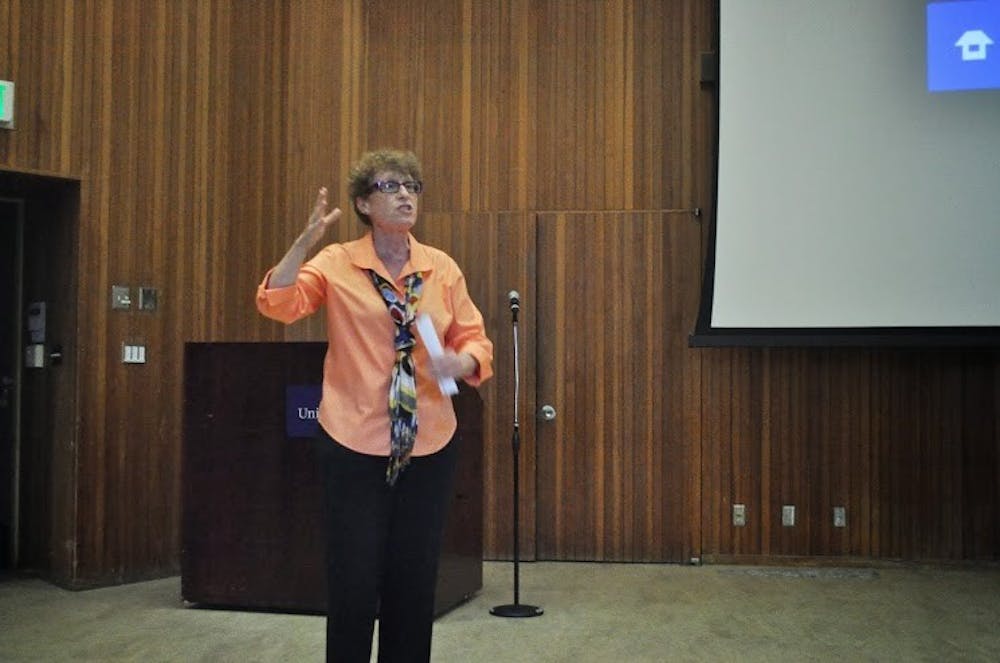By W.C. Lawson |
Last Thursday students and faculty gathered in the Buckley Center Auditorium for Spanish Professor Kate Regan’s film, “Trekking with Quijote” - the first event in UP’s new international film series.
“I admire the great filmmakers of the world,” said Regan. “I want to use filmmaking to enhance my teaching.”
A scholar, writer, traveler and avid enthusiast of Spanish culture, Regan has found filmmaking to be a novel way to impart knowledge to her students.
“I didn’t like the traditional way of education,” said Regan. “I wanted to find another way of engaging my students.”
“Trekking with Quijote,” Regan’s most recent film, is also her first focused on Spanish literature.
“I wanted to make a film that would not only speak to students, but I also wanted to make a film that would speak to people who are interested in Spain,” said Regan.
The film presents the experiences of Spanish families who have passed the 1605 novel, “Don Quijote a la Mancha,” an important piece of Spanish culture, down through many generations.
“I truly enjoyed watching the film including the questions that were asked to readers of Don Quijote,” junior Baris Inan said.
Regan’s passion for filmmaking is not a new development. When Regan was a child, she found over 1,500 feet of film her father had made of family videos. She fell in love with her father’s camera and movie projector in high school and started making videos of her classes.
After the camera broke down shortly after receiving it, she put filming aside. But 14 years later, while teaching and working on her doctorate in Spanish culture and literature in 1992, she picked it back up, using film in projects with her students to make classroom skits.
While taking the first group of UP students to Segovia, Spain for the Spanish study abroad program in 2003, Regan found an opportunity to work with Segovians who researched their ancestry to share the history and culture of Segovia. Instead of pursuing her original plan of translating texts from Spanish into a book, Regan chose to use filmmaking to dig into the history of medieval Spanish culture. In 2005, Regan completed her first film, “The Sephardic Legacy of Segovia: Pentimento of the Past.”
“If you scratch the surface of a medieval town, you’re going to hit into some history, and all of this history has been covered up,” Regan said.
In January 2006 Regan began working on another film project called “Fiesta Remos.” This film focused on singer Judy Frankel and her role in Sephardic Jewish culture and musical tradition in Segovia. After four days of gathering footage, Regan went back to Portland to begin editing the project. A year later she realized she needed more material, but her beloved friend, Frankel, had been diagnosed with cancer. With 90 percent footage, Regan connected with Frankel one last time to complete the film.
“The gift in this film was the chance to meet and work with Judy Frankel,” Regan said. “And even though we only knew each other for a short amount of time, thanks to her generous spirit we created a beautiful bond.”
Regan said that the showcase of her latest film, “Don Quijote,” was an amazing experience last Thursday, and wanted to thank everyone who came out and supported the film. The film will be used in the Don Quijote Spanish class this year.
“I feel like Dr. Regan did a very good job capturing the cultural importance of Don Quijote in Spain,” senior Katie Chale said. “I enjoyed the the stories that the cast had to share about their experiences with the book.”
Although Regan doesn’t necessarily want to make a career out of filmmaking, she feels that it is a great medium to engage her students in a way that writing cannot.
“I am very much coming to peace with how I am using film,” Regan said. “Teaching will always be a part of my filmmaking.”








